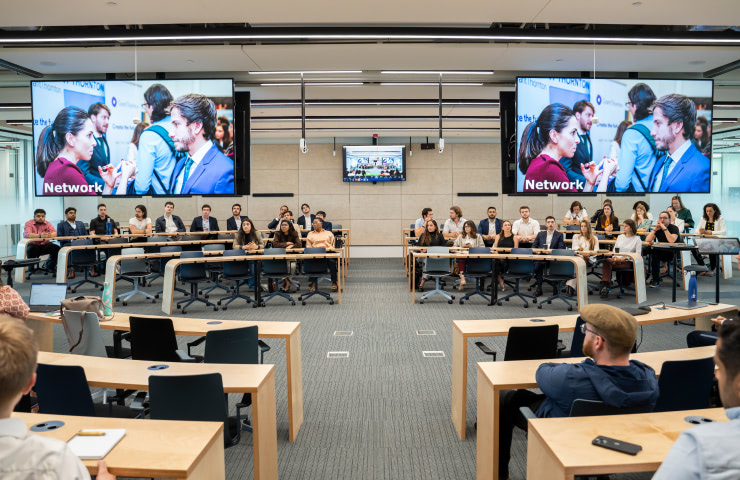04/10/2023
STEM education is important now more than ever. Our new Master in Software Engineering helps you take advantage of the ample opportunities in this dynamic field.
The need for high-quality professionals in STEM disciplines—science, technology, engineering and mathematics—has grown consistently in the last few years. But demand for software engineering expertise, in particular, has risen by 17% in 2023 alone across all industries. And with the rapid pace of innovation in the digital arena, this trend is only set to continue.
Why software engineering?
Roles in cloud services, AI and machine learning, Software as a Service (SaaS), cybersecurity and big data all require software engineering skills. That’s why our new Master in Software Engineering imparts the technical competences and practical know-how to leverage emerging technologies and address the real-life challenges facing business and society.
This isn’t just about teaching you to be a programmer. Instead, the program delivers a comprehensive exploration of both the theory and hands-on applications of cloud computing, DevOps, software architecture and design, concurrent and parallel programming, AI and more. It includes advanced topics in the discipline, examining the latest technologies like neural networks and covering essential modern skills such as cloud security and ethical hacking.
What’s more, you’ll have the opportunity to gain critical professional certifications from Google Cloud, AWS Cloud and GitLab.
The Master in Software Engineering is a carefully curated blend of theory and practice that will open doors in any professional sphere.

Career possibilities after the Master in Software Engineering
It’s a myth that software engineers simply sit in front of a screen all day, poring over countless lines of code. They do design and write code, of course. But the modern role encompasses the design, implementation and maintenance of complete systems, including testing both software and hardware, examining user needs to improve UX and optimizing efficiency in operating systems.
The Master in Software Engineering takes a holistic approach that builds multidisciplinary skills that can be applied in a variety of other roles in every conceivable industry:
- Software engineer
Software is a constantly evolving landscape as tech moves quickly and business strategies change to keep up with the latest developments. Software engineers create, maintain and deliver systems that meet those evolving needs. This job calls for you to keep your knowledge of the ecosystem up to date and work closely with end users to ensure your software solutions meet their needs.
- App developer
Today, apps make many aspects of our lives easier. Developers bring the end users’ needs to life in everything from business, to everyday tasks like banking and transport, and in our leisure time with games.

It’s a role that not only requires strong programming skills but also problem-solving, creativity, excellent communication and an understanding of business processes and restraints.
- Cybersecurity specialist
Cybersecurity is a critical concern in business, government and beyond. As a cybersecurity expert, you are the gatekeeper of your organization’s data and systems. Working as a consultant or advising your employer, you’ll play a crucial role in monitoring and preventing denial-of-service (DoS) attacks, online theft and data breaches. You must stay constantly up-to-date on the latest security and tech developments in order to offer the best guidance on cyber resilience and security awareness.
- Game developer
If you have keen creative skills to combine with your software expertise, game development can be an extremely rewarding career in every sense. Collaborative skills to work with game designers, calmness under deadline pressure and problem-solving skills are all essential to this role. But this can be a fun career in a lucrative industry—there are over 3 billion players worldwide and it generates more than $180 billion in revenue per year!
- Web designer/developer
Web designers plan, create and code web pages according to their clients’ or their organization’s needs. On the other hand, web developers use programming languages to build reliable web-based applications and services. Both require strong programming skills, but you’ll also need creative talent to make your creations look good in the competitive digital realm, where form and function are equally important.
Who’s hiring software engineers?
The short answer is everyone. Multinational players in the digital space, including notable names like Microsoft, IBM, Cisco, Amazon and Accenture, always need highly talented people with cutting-edge software skills. However, doors in almost every industry or sector will open to somebody with the right skill set and practical experience. The financial sector, governments and nongovernmental multilaterals, healthcare, manufacturing, media, utilities, education and more—software engineers are in great demand by the world’s leading employers.
We already live our lives in the digital realm, spending much of our time there either working, entertaining ourselves or dealing with day-to-day tasks. It’s the new reality and the Master in Software Engineering will set you on a career path that leads you into our digital future with confidence.
If you have a strong STEM background and are ready to make an impact with your software engineering skills, this program could be the right fit for you.









